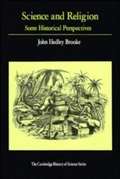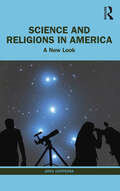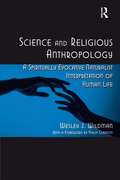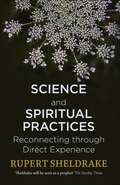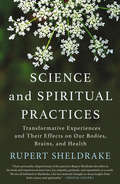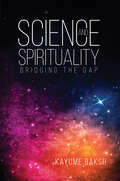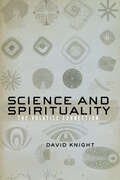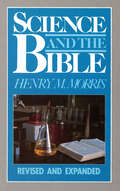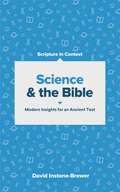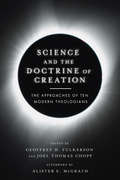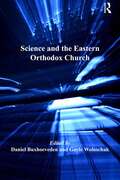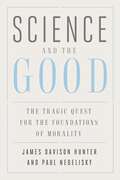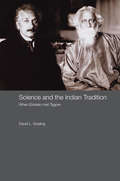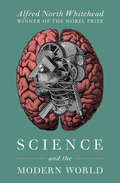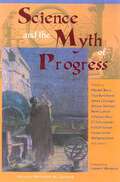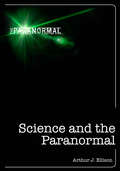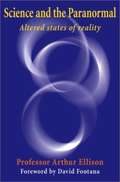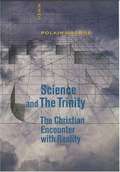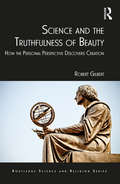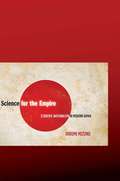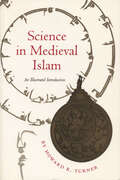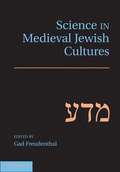- Table View
- List View
Science and Religion: Some Historical Perspectives
by John Hedley BrookeOne of the most fascinating and enduring issues in the development of the modern world is the relationship between scientific thought and religious belief. It is common knowledge that in Western societies there have been periods of crisis when new science has threatened established religious authority. The trial of Galileo in 1633 and the uproar caused by Darwin's Origin of Species(1859) are two famous examples. Taking account of recent scholarship in the history of science, Professor Brooke takes a fresh look at these and similar episodes, showing that science and religion have been mutually relevant in such a rich variety of ways that simple generalizations are not possible. Standing back from general theses affirming "conflict" or "harmony," which have so often served partisan interests, the author's object is to reveal the subtlety, complexity, and diversity of the interaction of science and religion as it has taken place in the past and in the twentieth century. Instead of treating science and religion as discrete definable entities, his approach is sensitive to shifting boundaries and willing to consider the contexts in which particular forms of science could be used both for religious and secular ends. The result is that, without assuming specialist knowledge, Brooke provides a wide-ranging study from the Copernican innovation to in vitro fertilization.
Science and Religions in America: A New Look
by Greg CootsonaWhat is religion? What is science? How do they interact with each other? Science and Religions in America: A New Look offers a cutting-edge overview of the diverse range of religious traditions and their complex and fascinating interaction with science. Pluralistic in scope, the book is different from traditional Christian and/or monotheistic approaches to studying the rich interplay of religion and science in multi-religious American culture. Featuring interviews with specialists in the field, Greg Cootsona draws on their insights to provide a comprehensive, accessible, and engaging introduction to the challenging interrelationship of religion and science. Each chapter focuses on a different religion within the United States, covering Buddhism, Christianity, Nature Religions, Islam, Judaism, Hinduism, and the Spiritual but Not Religious (SBNR). Global religious traditions and their inextricable relationship with science and technology are examined in an accessible and interactive format. With "lightning round Q&As," contributions from leading thinkers, and suggestions for further reading, this book primes undergraduate students for studying the interchange of science and religions (in the plural) and is an exciting new resource for those interested in these topics in contemporary America.
Science and Religious Anthropology: A Spiritually Evocative Naturalist Interpretation of Human Life (Ashgate Science And Religion Ser.)
by Wesley J. WildmanScience and Religious Anthropology explores the convergence of the biological sciences, human sciences, and humanities around a spiritually evocative, naturalistic vision of human life. The disciplinary contributions are at different levels of complexity, from evolution of brains to existential longings, and from embodied sociality to ecosystem habitat. The resulting interpretation of the human condition supports some aspects of traditional theological thinking in the world's religious traditions while seriously challenging other aspects. Wesley Wildman draws out these implications for philosophical and religious anthropology and argues that the modern secular interpretation of humanity is most compatible with a religious form of naturalistic humanism. This book resists the reduction of meaning and value questions while taking scientific theories about human life with full seriousness. It argues for a religious interpretation of human beings as bodily creatures emerging within a natural environment that permits engagement with the valuational potentials of reality. This engagement promotes socially borne spiritual quests to realize and harmonize values in everything human beings do, from the forging of cultures to the crafting of personal convictions.
Science and Spiritual Practices: Reconnecting through direct experience
by Rupert SheldrakeIn this pioneering book Rupert Sheldrake shows how science helps validate seven practices on which all religions are built, and which are part of our common human heritage:· Meditation· Gratitude· Connecting with nature· Relating to plants· Rituals· Singing and chanting· Pilgrimage and holy places. The effects of spiritual practices are now being investigated scientifically as never before, and many studies have shown that religious and spiritual practices generally make people happier and healthier. Rupert Sheldrake summarizes the latest scientific research on what happens when we take part in these practices, and suggests ways that readers can explore these fields for themselves. For those who are religious, Science and Spiritual Practices will illuminate the evolutionary origins of their own traditions and give a new appreciation of their power. For the non-religious, this book will show how the core practices of spirituality are accessible to all, even if they do not subscribe to a religious belief system. This is a book for anyone who suspects that in the drive towards radical secularism, something valuable has been left behind. Rupert Sheldrake believes that by opening ourselves to the spiritual dimension we may find the strength to live more wholesome and fulfilling lives.
Science and Spiritual Practices: Reconnecting through direct experience
by Rupert SheldrakeIn this pioneering book Rupert Sheldrake shows how science helps validate seven practices on which all religions are built, and which are part of our common human heritage:· Meditation· Gratitude· Connecting with nature· Relating to plants· Rituals· Singing and chanting· Pilgrimage and holy places. The effects of spiritual practices are now being investigated scientifically as never before, and many studies have shown that religious and spiritual practices generally make people happier and healthier. Rupert Sheldrake summarizes the latest scientific research on what happens when we take part in these practices, and suggests ways that readers can explore these fields for themselves. For those who are religious, Science and Spiritual Practices will illuminate the evolutionary origins of their own traditions and give a new appreciation of their power. For the non-religious, this book will show how the core practices of spirituality are accessible to all, even if they do not subscribe to a religious belief system. This is a book for anyone who suspects that in the drive towards radical secularism, something valuable has been left behind. Rupert Sheldrake believes that by opening ourselves to the spiritual dimension we may find the strength to live more wholesome and fulfilling lives.
Science and Spiritual Practices: Reconnecting through direct experience
by Rupert SheldrakeIn this pioneering book Rupert Sheldrake shows how science helps validate seven practices on which all religions are built, and which are part of our common human heritage:· Meditation· Gratitude· Connecting with nature· Relating to plants· Rituals· Singing and chanting· Pilgrimage and holy places. The effects of spiritual practices are now being investigated scientifically as never before, and many studies have shown that religious and spiritual practices generally make people happier and healthier. Rupert Sheldrake summarizes the latest scientific research on what happens when we take part in these practices, and suggests ways that readers can explore these fields for themselves. For those who are religious, Science and Spiritual Practices will illuminate the evolutionary origins of their own traditions and give a new appreciation of their power. For the non-religious, this book will show how the core practices of spirituality are accessible to all, even if they do not subscribe to a religious belief system. This is a book for anyone who suspects that in the drive towards radical secularism, something valuable has been left behind. Rupert Sheldrake believes that by opening ourselves to the spiritual dimension we may find the strength to live more wholesome and fulfilling lives.
Science and Spiritual Practices: Transformative Experiences and Their Effects on Our Bodies, Brains, and Health
by Rupert Sheldrake"I have personally adopted many of the practices Rupert describes in his book and experienced more love, joy, empathy, gratitude, and equanimity as a result. We are all indebted to Rupert, who has tirelessly brought us deep insights from both science and spirituality.&” ―Deepak ChopraThe effects of spiritual practices are now being investigated scientifically as never before, and many studies have shown that religious and spiritual practices generally make people happier and healthier. In this pioneering book, Rupert Sheldrake shows how science helps validate seven practices on which many religions are built, and which are part of our common human heritage: meditation, gratitude, connecting with nature, relating to plants, rituals, singing and chanting, and pilgrimage and holy places.Sheldrake summarizes the latest scientific research on what happens when we take part in these practices, and suggests ways that readers can explore these fields for themselves. For those who are religious, Science and Spiritual Practices will illuminate the evolutionary origins of their own traditions and give a new appreciation of their power. For the nonreligious, this book will show how the core practices of spirituality are accessible to all.This is a book for anyone who suspects that in the drive toward radical secularism, something valuable has been left behind. Rupert Sheldrake compellingly argues that by opening ourselves to the spiritual dimension, we may find the strength to live more fulfilling lives.
Science and Spirituality
by Kayume BakshThis book provides a fascinating, well-researched, and thorough discussion of the connections between science and spirituality, including religion. It is eye-opening and allows readers to truly redefine how they look at these disciplines while providing, at the same time, a vibrant perspective for those embarking on such an exercise for the first time.Science investigates the physical world, where space, time, and matter comprise the main aspects of its empirical approach, that is, of physically proving all that there is around us. Spirituality goes beyond the physical. Here, physical quantities become non-existent and so our connections are perceived through seemingly nonrational (but hardly irrational) unscientific means. Religion is rendered useless as a way of explaining how the universe works. Quantum mechanics, an integral part of modern physics, is helping to bring about a closer convergence by showing remarkable similarities between advanced scientific observations and what has been taught for centuries in the wisdom traditions, known as spirituality. This insightful information continues to amaze us like none before.We, therefore, now have the right combination and evidence to show why the gap between science and spirituality must be bridged so that we can finally embrace the answers to mysterious questions about the universe and life. This thought-provoking book provides the details you need.We stand on the verge of heralding a new paradigm or, rather, a metaparadigm – the mother of all paradigms – one that unfolds a new vision of reality that includes consciousness for the first time, not excludes it – as science still does.Whether you belong to a religion or not, are a spiritualist, an atheist, an agnostic, or just curious about the universe and life, this book is for you.
Science and Spirituality: The Volatile Connection
by David KnightUntil the end of the eighteenth century, almost everyone believed that the empirical world of science could produce evidence for a wise and loving God. By the twenty-first century this comforting certainty has almost vanished. What caused such a cataclysmic change in attitudes to science and to the world?Science and Spirituality offers a new history of the interaction between Western science and faith, which explores their volatile connection, and challenges the myth of their being locked in inevitable conflict.Journeying from the French Revolution to the present day, and taking in such figures as Francis Bacon, René Descartes, Charles Darwin, Immanuel Kant, Albert Einstein, Mary Shelley and Stephen Hawking, David Knight shows how science evolved from medieval and Renaissance forms of natural theology into the empirical discipline we know today. Focusing on the overthrow of Church and State in revolutionary France, and on the crucial nineteenth century period when a newly emerging scientific community rendered science culturally accessible, Science and Spirituality shows how scientific disenchantment has provided some of our most flexible and powerful metaphors for God, such as the hidden puppet-master and the blind watchmaker, and illustrates how questions of moral and spiritual value continue to intervene in scientific endeavour.
Science and the Bible
by Henry MorrisStudy scientific data and biblical truths in five chapters: Science in the Bible, The Theory of Evolution, Science and the Flood, The Bible and Ancient History, and Fulfilled Prophecy.
Science and the Bible
by Henry MorrisStudy scientific data and biblical truths in five chapters: Science in the Bible, The Theory of Evolution, Science and the Flood, The Bible and Ancient History, and Fulfilled Prophecy.
Science and the Bible: Modern Insights for an Ancient Text (Scripture in Context Series)
by David Instone-BrewerIs the Bible fundamentally at odds with science? Science and the Bible are often pitted against each other, causing many to either defend science at Scripture's expense, or vice versa. Instead, what if we saw them as friends? Can Christians appreciate scientific insights like they do archaeological discoveries--as a source of knowledge to illuminate the biblical world and our own? In Science a nd the Bible, David Instone-Brewer takes a refreshing and non-antagonistic approach, asking how science can aid our interpretation of the Bible. The result is stimulating on topics such as God's omnipresence, the origin of languages, the nature of eternity, the relationship of spirit and soul, the reality of resurrection, and Jesus' human experience. In short, readable chapters, Science and the Bible enables the curious layperson to reread the Bible with fresh perspectives from modern scientific insights. The Scripture in Context series is driven by the conviction that there is nothing as exciting, direct, provocative, and spiritually enlightening as the Bible when we read it as it was meant to be read. Each book in the series dives into the ancient cultural context behind Bible passages, examining the effect this context had on what the Bible writers were saying and how we should understand their words today. When we read the Bible in light of its context, it is anything but boring. Instead, God's word can speak to us as powerfully as it did to those who first read it.
Science and the Doctrine of Creation: The Approaches of Ten Modern Theologians
by Alister E. McGrathKevin J. Vanhoozer on T. F. TorranceKatherine Sonderegger on Karl BarthCraig G. Bartholomew on Abraham KuyperChristoph Schwöbel on Wolfhart Pannenberg
Science and the Eastern Orthodox Church
by Daniel Buxhoeveden Gayle WoloschakScience and the Eastern Orthodox Church explores core theological and philosophical notions and contentious topics such as evolution from the vantage point of science, Orthodox theology, and the writings of popular recent Orthodox critics as well as supporters. Examining what science is and why Eastern Orthodox Christians should be concerned about the topic, including a look at well known 20th century figures that are considered holy elders or saints in the Orthodox Church and their relationship and thoughts about science, contributors analyse the historical contingencies that contribute to the relationship of the Orthodox Church and science both in the past and present. Part II includes critiques of science and considers its limitations and strengths in light of Orthodox understandings of the experience of God and the so called miraculous, together with analysis of two Orthodox figures of the 20th century that were highly critical of science, it's foundations and metaphysical assumptions. Part III looks at selected topics in science and how they relate to Orthodox theology, including evolution, brain evolution and consciousness, beginning of life science, nanotechnology, stem cell research and others. Drawing together leading Orthodox scientists, theologians, and historians confronting some of the critical issues and uses of modern science, this book will be useful for students, academics and clergy who want to develop a greater understanding of how to relate Orthodoxy to science.
Science and the Good: The Tragic Quest for the Foundations of Morality (Foundational Questions in Science)
by James Davison Hunter Paul NedeliskyWhy efforts to create a scientific basis of morality are neither scientific nor moral: &“Important and timely.&”—The Wall Street Journal In this illuminating book, James Davison Hunter and Paul Nedelisky trace the origins and development of the centuries-long, passionate, but ultimately failed quest to discover a scientific foundation for morality. The &“new moral science&” led by such figures as E.O. Wilson, Patricia Churchland, Sam Harris, Jonathan Haidt, and Joshua Greene is only the newest manifestation of that quest. Though claims for its accomplishments are often wildly exaggerated, this new iteration has been no more successful than its predecessors. But rather than giving up in the face of this failure, the new moral science has taken a surprising turn. Whereas earlier efforts sought to demonstrate what is right and wrong, the new moral scientists have concluded, ironically, that right and wrong don&’t actually exist. Their (perhaps unwitting) moral nihilism turns the science of morality into a social engineering project. If there is nothing moral for science to discover, the science of morality becomes, at best, a feeble program to achieve arbitrary societal goals. Concise and rigorously argued, Science and the Good is a definitive critique of a would-be science that has gained extraordinary influence in public discourse today—and an exposé of that project&’s darker turn. &“Science and the Good is a closely argued, always accessible riposte to those who think scientific study can explain, improve or even supersede morality . . . A generous and thoughtful critique.&” —The Daily Telegraph
Science and the Indian Tradition: When Einstein Met Tagore (India in the Modern World #Vol. 3)
by David L. GoslingThis new text is a detailed study of an important process in modern Indian history. During the late nineteenth and early twentieth century, India experienced an intellectual renaissance, which owed as much to the influx of new ideas from the West as to traditional religious and cultural insights. Gosling examines the effects of the introduction of Western science into India, and the relationship between Indian traditions of thought and secular Western scientific doctrine. He charts the early development of science in India, its role in the secularization of Indian society, and the subsequent reassertion, adaptation and rejection of traditional modes of thought. The beliefs of key Indian scientists, including Jagadish Chandra Bose, P.C. Roy and S.N. Bose are explored and the book goes on to reflect upon how individual scientists could still accept particular religious beliefs such as reincarnation, cosmology, miracles and prayer. Science and the Indian Tradition gives an in-depth assessment of results of the introduction of Western science into India, and will be of interest to scholars of Indian history and those interested in the interaction between Western and Indian traditions of intellectual thought.
Science and the Modern World: Lowell Lectures, 1925
by Alfred North WhiteheadThe famed mathematician and philosopher takes readers on a journey into a new scientific age, exploring topics from relativity to religion. Alfred North Whitehead, one of the great figures in the philosophy of science, wrote this prescient work nearly a century ago. Yet, in an era that has us reckoning with science and technology&’s place and meaning in our lives, it remains as relevant as ever. Science and the Modern World puts scientific discovery into historical and cultural context—exploring the effects of science and people on each other. &“It is a work not only of the first importance but also of great beauty. . . . Vivid writing.&” —Nature
Science and the Myth of Progress
by Mehrdad M. ZarandiA collection of essays by scholars, philosophers, and scientists offering penetrating answers to some of the most important questions of the day.
Science and the Paranormal (The Paranormal)
by Arthur J. EllisonThe Paranormal, the new ebook series from F+W Media International Ltd, resurrecting rare titles, classic publications and out-of-print texts, as well as new ebook titles on the supernatural - other-worldly books for the digital age. The series includes a range of paranormal subjects from angels, fairies and UFOs to near-death experiences, vampires, ghosts and witchcraft. In facts, not fiction, this book presents the case for the paranormal. Changing the way we look at the universe is not easy, and requires a true openness to exploration and experiment. Professor Ellison suggests that most of us are conditioned by our Western science-based education to think that the universe is much simpler and 'material' than it really is. He argues that we should recognize the limits of the current scientific worldview which fails to account for genuine paranormal experiences, including phenomena such as out-of-body experiences (OBE), reliably reported by thousands of people.
Science and the Paranormal: Altered States of Reality
by Arthur J. EllisonReviews the empirical evidence for the existence of paranormal abilities, describes the author's experiences in this field, and gives practical advice for readers wishing to develop these abilities.
Science and the Trinity: The Christian Encounter with Reality
by John C. PolkinghorneMost often, the dialogue between religion and science is initiated by the discoveries of modern science--big bang cosmology, evolution, or quantum theory, for example. In this book, scientist-theologian John Polkinghorne changes the discussion. He approaches the dialogue from a little-explored perspective in which theology shapes the argument and sets the agenda of questions to be considered. The author begins with a review of approaches to science and religion in which the classification focuses on theological content rather than on methodological technique. He then proceeds with chapters discussing the role of Scripture, a theology of nature, the doctrine of God, sacramental theology, and eschatology. Throughout, Polkinghorne takes the perspective of Trinitarian thinking while arguing in a style that reflects the influence of his career as a theoretical physicist. In the final chapter, the author defends the appropriateness of addressing issues of science and religion from the specific standpoint of his Christian belief. His book provides an important model for theologians and scientists alike, showing how their two fields can inform one another in significant ways.
Science and the Truthfulness of Beauty: How the Personal Perspective Discovers Creation (Routledge Science and Religion Series)
by Robert GilbertWhen scientists describe their results or insights as 'beautiful', are they using the term differently from when they use it of a landscape, music or another person? Science and the Truthfulness of Beauty re-examines the way in which seeing beauty in the world plays the key role in scientific advances, and argues that the reliance on such a personal point of view is ultimately justified by belief that we are made in the 'image of God', as Christian and Jewish believers assert. It brings a fresh voice to the ongoing debate about faith and science, and suggests that scientists have as much explaining to do as believers when it comes to the ways they reach their conclusions.
Science for the Empire
by Hiromi MizunoMizuno (history, U. of Minnesota) explores the relationship between discourses of science, nationalism, and modernity in Imperial Japan, particularly focusing on competing promotions of science amongst Japanese technology-bureaucrats, Marxist intellectuals, and popular science writers engaged in the developing the new genre of popular science (tsuzoku kagagku) journalism and how those competing visions were eventually co-opted and mobilized by the Imperial state in support of wartime objectives. Annotation ©2009 Book News, Inc. , Portland, OR (booknews. com)
Science in Medieval Islam: An Illustrated Introduction
by Howard R. TurnerDuring the Golden Age of Islam (seventh through seventeenth centuries A. D. ), Muslim philosophers and poets, artists and scientists, princes and laborers created a unique culture that has influenced societies on every continent. This book offers a fully illustrated, highly accessible introduction to an important aspect of that culture-the scientific achievements of medieval Islam. Howard Turner opens with a historical overview of the spread of Islamic civilization from the Arabian peninsula eastward to India and westward across northern Africa into Spain. He describes how a passion for knowledge led the Muslims during their centuries of empire-building to assimilate and expand the scientific knowledge of older cultures, including those of Greece, India, and China. He explores medieval Islamic accomplishments in cosmology, mathematics, astronomy, astrology, geography, medicine, natural sciences, alchemy, and optics. He also indicates the ways in which Muslim scientific achievement influenced the advance of science in the Western world from the Renaissance to the modern era. This survey of historic Muslim scientific achievements offers students and general readers a window into one of the world's great cultures, one which is experiencing a remarkable resurgence as a religious, political, and social force in our own time.
Science in Medieval Jewish Cultures
by Gad FreudenthalScience in Medieval Jewish Cultures provides the first comprehensive overview by world-renowned experts of what we know today of medieval Jews' engagement with the sciences. Many medieval Jews, whether living in Islamic or Christian civilizations, joined Maimonides in accepting the rationalist philosophical-scientific tradition and appropriated extensive bodies of scientific knowledge in various disciplines: astronomy, astrology, mathematics, logic, physics, meteorology, biology, psychology, science of language and medicine. The appropriated texts - in the original or in Hebrew translation - were the starting points for Jews' own contributions to medieval science and also informed other literary genres: religious-philosophical works, biblical commentaries and even Halakhic (legal) discussions. This volume's essays will provide readers with background knowledge of medieval scientific thought necessary to properly understand canonical Jewish scientific texts. Its breadth reflects the number and diversity of Jewish cultures in the Middle Ages and the necessity of considering the fortunes of science in each within its specific context.
